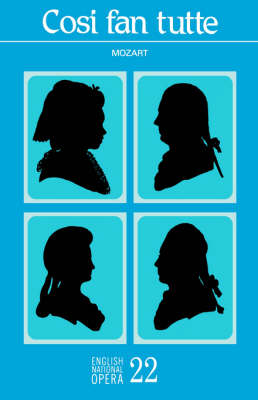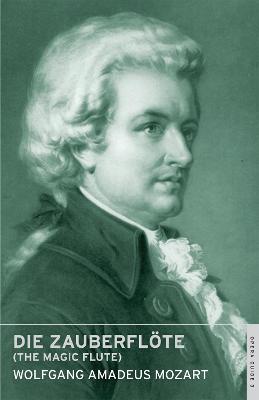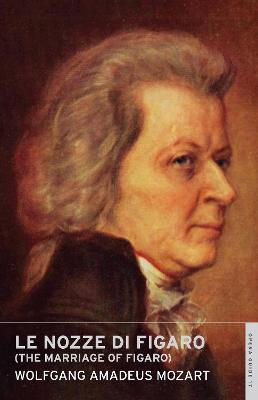Overture Opera Guides
4 total works
Cosi Fan Tutte
by Wolfgang Amadeus Mozart, Da Ponte, Lorenzo, Browne, and Cox
Published 31 December 1982
English National Opera Guides are ideal companions to the opera. They provide stimulating introductory articles together with the complete text of each opera in English and the original. "It was a treat so truly intellectual that every ear and every breast, susceptible of harmony and of impression, was gratified to a degree beyond our power to describe." Thus one of the first London reviews in 1811 of Mozart's beautiful opera, "Cosi fan tutte." Its enigmatic mixture of a detached experiment in human foibles and a struggle of sincere emotions has often disturbed audiences: in the last century it was performed under many different titles and extensively bowdlerised. H.C. Robbins Landon observes, however, that Mozart's heartfelt music proves he is openly on the side of the angels (that is, the ladies), not the deceivers, however cynical da Ponte's words alone appear to be. Brian Trowell describes the sophisticated world in which the opera was conceived, while John Stone traces the origins of the libretto to Ancient Greece, medieval Italy and even to China. The text is certainly da Ponte's most original masterpiece and is here presented in a newly revised English version.
"Don Giovanni" is one of Mozart's most significant and popular operas. This edition begins with a discussion of the comic elements of this unusual comic opera by Michael F. Robinson. An overall view of the score is given by David Wyn Jones, showing how Mozart maintained dramatic momentum over two long acts and giving an overview of the dramatic pacing and orchestration in some of the most important scenes. Christopher Raeburn concludes the commentary with an engaging portrait of Da Ponte, Mozart's 'libertine librettist', and his relationship with the composer. This edition contains more than twenty photographs covering performances of Don Giovanni to the present day, a detailed thematic analysis, the libretto in Italian with a facing literal translation, and an up-to-date discography and bibliography. "Overture Opera Guides" are an invaluable companion for lovers of opera and provide an insight for anyone wanting to explore opera in a little more detail.
With his last opera Mozart created a piece of theatre which defies categorization. In theory it is a Singspiel, a mixture of songs and dialogue, in which the spectacular effects and comedy fit naturally: they appeal today as much as they did when it first opened in popular Viennese theatre two hundred years ago. Rodney Milnes recalls some of the other pieces playing at the time, such as Kaspar the Bassonist, or The Magic Zither. On the other hand, it belongs to a tradition of Enlightenment texts in which a young Prince, destined to be a ruler, learns from his adventures how to behave wisely as a social being. This is a re-working of the Orpheus myth, in the context of the Age of Reason and Freemasonry. David Cairns describes the many beauties of the score in loving detail, taking the reader through the complex plot, to clarify and interpret it. Famous commentaries by Goethe, Berlioz, E.T.A. Hoffmann and G.B. Shaw reveal their enthusiasm for the opera. A useful and unusual feature of this guide is the complete dialogue, in German with an English translation, which is often badly cut in performance.
Like so many fairy-tales, The Magic Flute repays careful attention: its music has a charm to inspire the child in every listener.
Like so many fairy-tales, The Magic Flute repays careful attention: its music has a charm to inspire the child in every listener.
John Wells introduces the opera with a high-spirited account of the action-packed career of the author, in many respects the prototype of Figaro himself. Basil Deane explores the score: he shows that Mozart's characters are illuminated here not so much in soliloquies but in their reactions to each other. Composer Stephen Oliver discusses how the comedy exists not just in the words but, essentially, in the music. The full Italian text is given, with a note on the order of scenes in Act Three and the alternative passages Mozart wrote for the 1789 revival. The classic translation of E.J. Dent is an excellent way to get to know the twists and turns of the plot and the stylish wit of da Ponte's innuendos.
Contents: A Society Marriage, John Wells; A Musical Commentary, Basil Deane; Music and Comedy in 'The Marriage of Figaro, Stephen Oliver; Beaumarchais's Characters; Le nozze di Figaro: Libretto by Lorenzo da Ponte; The Marriage of Figaro: English version by Edward J. Dent
Contents: A Society Marriage, John Wells; A Musical Commentary, Basil Deane; Music and Comedy in 'The Marriage of Figaro, Stephen Oliver; Beaumarchais's Characters; Le nozze di Figaro: Libretto by Lorenzo da Ponte; The Marriage of Figaro: English version by Edward J. Dent



